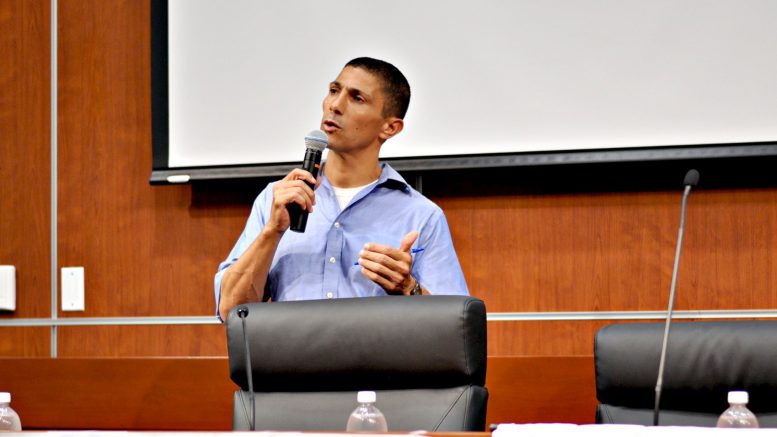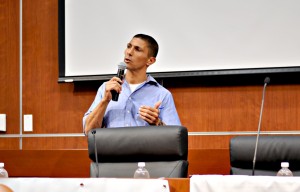A prominent Israeli diplomat and political advisor spoke before a group of about 65 students and faculty members in the Graham Center on Sept 20 on the subject of recent political developments in the Middle East.
But the representative who spoke on Sept. 20 is no typical Israeli envoy: Israel’s highest-ranking Muslim diplomat, Ishmael Khaldi is an Israeli Arab, a Bedouin who spent the first eight years of his life living in a Bedouin tent in the Galilee.
Khaldi’s lecture, titled “Israel Today and the Arab Spring,” dealt with the recent uprisings in the Middle East as well as the current Palestinian attempt to gain U.N. recognition of Palestinian statehood. Khaldi, who served in the Israeli Defense Forces before being appointed Deputy Consul in the Israeli Consulate in San Francisco in 2006, and later becoming the Middle East and Arab Affairs Advisor to the government of Foreign Minister Avigdor Lieberman, said he considers both Israelis and Arabs his brothers.
“I want to be a bridge of understanding between my country, the Jewish state and the countries of the Middle East,” he said.
Not long after Khaldi took his advising position, the Arab world began to change dramatically, as protests erupted across the region. For Khaldi, the message was very clear.
“People in those countries want to live exactly like yourselves – in open societies, in democracies . . . and like ourselves – the people in Israel – the only democracy in the Middle East,” said Khaldi.
“Some people call it ‘an Arab spring,’” he said. “I don’t think it’s ‘spring.’ It’s going to take a long time. . . . And who’s going to win? Will it be the liberal power? Or the radical power?”
Speaking of the uprising in Egypt, where the Israeli embassy was recently attacked by protesters, Khaldi said it was clear that “. . . the people who stood up in Tahrir square . . . demanded three main things: to topple the regime, Mubarak . . . political freedom . . . and . . . economic improvement.”
“Both the military council and even the Muslim Brotherhood,” said Khaldi, “will never touch, never cancel, the peace treaty with Israel. That’s a common interest.” “Israel,” he said, “is and will always be the strongest country in the Middle East.”
Even so, Khaldi said that aspects of the revolutions were troubling for Israel. “Last week,” he said, “Israel had to evacuate our diplomats from the embassy . . . in Jordan . . . and in Egypt . . . Try to imagine: we are speaking about ‘spring,’ we are speaking about something that’s supposed to flourish: democracy, building relations – and the opposite thing is happening.”
Khaldi also spoke of the uprising in Syria and said that he could envision two potential outcomes: that the Assad regime would stay, in which case “. . . [Assad] will be dealing . . . to improve the situation inside Syria . . . and he will tend not to confront Israel; he will be dealing with internal issues,” and a second possibility, in which “. . . his regime will be toppled and a worse regime will take over, and then it only adds to the instability.”
Khaldi spoke last of the current Palestinian push for formal U.N. recognition of Palestinian statehood, saying that it is problematic because of its unilateral nature and the fact that it is being pursued in the absence of negotiations. The Palestinian Authority abandoned peace talks in March of 2010 to protest Israeli settlement construction in the West Bank – land the Palestinian Authority considers essential for a future Palestinian state.
“Israel wants to see the Palestinians living in dignity in their own state,” Khaldi said. “But let’s face reality. The only way to achieve a two-state solution is . . . direct negotiation – no matter how tough, and no matter what the background is.”
FIU Shalom Vice President Yonaton Goldstein, a sophomore, said he agreed with much of what Khaldi said and appreciated his directness.
“Before hearing him,” he said, “I thought, sure, [the Palestinians] will probably get the vote, probably get the recognition, but then what? They still have to come back and talk to the Israelis. . . . they’re still going to have to discuss borders and the right of return . . . it’s still in need of negotiations.”
Rene Padron, a senior majoring in International Relations, said that the difficulties of creating and gaining recognition for a separate Palestinian state and then negotiating a peace with Israel made him wonder about the possibility of a one state solution “ . . . that would be an ’Israel-Palestine’ or ‘Palestine-Israel’ . . . with really small font size, so it’d fit on the map!”
Hadassah Dukes, an FIU Shalom member and sophomore chemistry major, said “I completely agree that the countries surrounding [Israel] would help the situation more if they were democratic as well. It was refreshing . . . to have a live dialogue here, with actual information as opposed to what we hear on the radio.”
Khaldi’s lecture was sponsored by FIU’s Judaic Studies Program and co-sponsored by the Middle East Studies Program, the Jewish National Fund, the Caravan for Democracy, MediaWatch International, Shalom FIU and the Hasbara Fellowships.







Be the first to comment on "‘Arab Spring’ addressed during lecture"